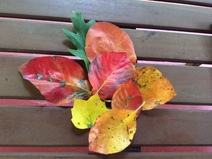 {Note: The following essay was written by Gary Phillips, North Carolina writer, naturalist, entrepreneur. We read it with an eye toward this question: In this present Anthropocene Age,* what is Natural, what is Wild?} My favorite forest is the wood below our house. First of all, the rough driveway is lined with huge red cedars, remnants of a 100-year-old fencerow. The largest are over 50 feet tall. Along the edge of the house and pointing toward the creek is another fencerow, populated with dogwood and young water oaks and rich sassafras, all chaotically stretching toward any available light. In a band above our little creek there runs a field of 20- to 30-year-old loblolly pines, the memory of an abandoned pasture still in evidence along its margins: warm grassy patches bordered with berry vines, stone piles, barbed wired nailed to a post oak. The banks of the creek host maples and sweet gum and tag alder, with a few paw paws for grace. A black willow stands in its own patch of sunlight below the garden, bordered by wild persimmons and one feral pecan tree. It’s good to walk in the shade there, among the tanagers and jays. My favorite site is the small floodplain on the other side of the log bridge, grounded by a huge maple and a grove of ancient water oaks. The first time I walked there with my friend Leif Diamant we were met by a pair of pileated woodpeckers swimming from tree to tree. I thought: “I could live here.” This is no wilderness or pristine place. Everywhere there is evidence of human activity, even mismanagement. But this little forest is within my view from the kitchen table, always mysterious, surprising and changeable. It is precious to me. I try to love it as best I can. --Gary Phillips (Gary's website) *Anthropocene is a proposed term for the current geological age, viewed as the period during which human activity has been the dominant influence on climate and the environment. Comments are closed.
|
When we see land as a community to which we belong, we may begin to use it with love and respect.... Conservation, viewed in its entirety, is the slow and laborious unfolding of a new relationship between people and land." There is in fact no distinction between the fate of the land and the fate of the people. When one is abused, the other suffers. From the PresidentSCP President Chuck Roe looked at land conservation along the route of John Muir's "Southern Trek." About ViewpointThis blog offers views of our Board and partners. We invite your viewpoint on the following questions: Archives
April 2024
Categories
All
|

 RSS Feed
RSS Feed